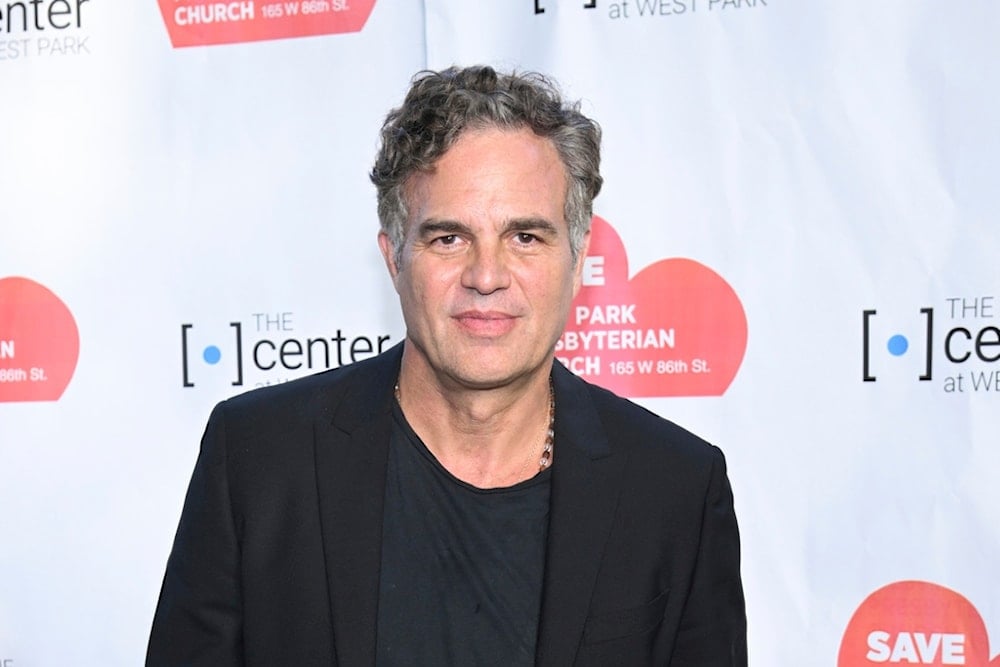1,200+ film figures vow boycott of 'Israel' over Gaza genocide
From Oscar winners to rising stars, film workers demand accountability, are refusing to collaborate with Israeli institutions tied to oppression.
-

Mark Ruffalo attends The Center at West Park's "All the President's Men" reading at Guild Hall to benefit West-Park Presbyterian Church on Monday, Aug. 25, 2025, in East Hampton, N.Y. (AP)
Hundreds of actors, directors, and film workers have pledged not to collaborate with Israeli cultural institutions they say are complicit in “genocide and apartheid against the Palestinian people,” The Guardian reported.
“As film-makers, actors, film industry workers, and institutions, we recognise the power of cinema to shape perceptions,” the statement reads. “In this urgent moment of crisis, where many of our governments are enabling the carnage in Gaza, we must do everything we can to address complicity in that unrelenting horror.”
The initiative has drawn more than 1,200 signatories, including directors Yorgos Lanthimos, Ava DuVernay, Asif Kapadia, Boots Riley, and Joshua Oppenheimer. Prominent actors such as Olivia Colman, Mark Ruffalo, Tilda Swinton, Javier Bardem, Ayo Edebiri, Riz Ahmed, Josh O’Connor, Cynthia Nixon, Julie Christie, Ilana Glazer, Rebecca Hall, Aimee Lou Wood, and Debra Winger also backed the call.
The pledge cites inspiration from the cultural boycott that helped end apartheid in South Africa.
What the pledge entails
Signatories commit to avoiding screenings, appearances, or cooperation with institutions, including festivals, cinemas, broadcasters, and production companies, that they deem complicit. Examples of complicity include “whitewashing or justifying genocide and apartheid, and/or partnering with the government committing them.”
“We answer the call of Palestinian film-makers, who have urged the international film industry to refuse silence, racism, and dehumanisation, as well as to ‘do everything humanly possible’ to end complicity in their oppression,” the statement continues.
The campaign is spearheaded by Film Workers for Palestine. Among those who joined is screenwriter David Farr, who linked his stance to his own family history. “As the descendant of Holocaust survivors, I am distressed and enraged by the actions of the Israeli state,” he said. “In this context, I cannot support my work being published or performed in Israel. The cultural boycott was significant in South Africa. It will be significant this time and in my view should be supported by all artists of conscience.”
Targets of boycott
An FAQ accompanying the pledge identifies "Israel’s" leading festivals, including the Jerusalem Film Festival, Haifa International Film Festival, Docaviv, and TLVFest, as examples of institutions tied to the occupation entity. It states that most Israeli film production and distribution companies “have never endorsed the full, internationally recognised rights of the Palestinian people.”
While the statement does not explicitly reference the Boycott, Divestment, and Sanctions (BDS) movement, it is among the most significant cultural boycott initiatives launched since "Israel’s" current war on Gaza began. It also draws on precedents such as Filmmakers United Against Apartheid, founded in 1987 by Jonathan Demme, Martin Scorsese, and others who refused to screen their work in apartheid-era South Africa.
Part of wider cultural pushback
The campaign comes amid a surge of industry activism against the ongoing Israeli genocide in Gaza. Earlier this summer, Joaquin Phoenix, Pedro Pascal, Ralph Fiennes, and Guillermo del Toro were among hundreds who signed an open letter criticising the film industry’s silence.
Many of those figures also urged SAG-AFTRA last year to protect members from blacklisting over their views on Palestine. `, the Actors’ Equity Association has since advised members to avoid working with certain Israeli cultural institutions.
Palestinian voices have also pressed the case. In 2023, more than 65 Palestinian filmmakers accused Hollywood of “dehumanizing” Palestinians on screen, urging international peers to shun companies that “whitewash and justify Israel’s crimes against us.”
That same spirit carried into this year’s Venice Film Festival, where The Voice of Hind Rajab, a film about a five-year-old girl killed by Israeli occupation forces in Gaza, earned a 23-minute standing ovation. Produced by Brad Pitt, Jonathan Glazer, Joaquin Phoenix, Rooney Mara, and Alfonso Cuaron, the film became one of the festival’s most talked-about works.
Read more: Palestinian director at Cannes: Gaza filmmakers are 'the story'

 4 Min Read
4 Min Read










